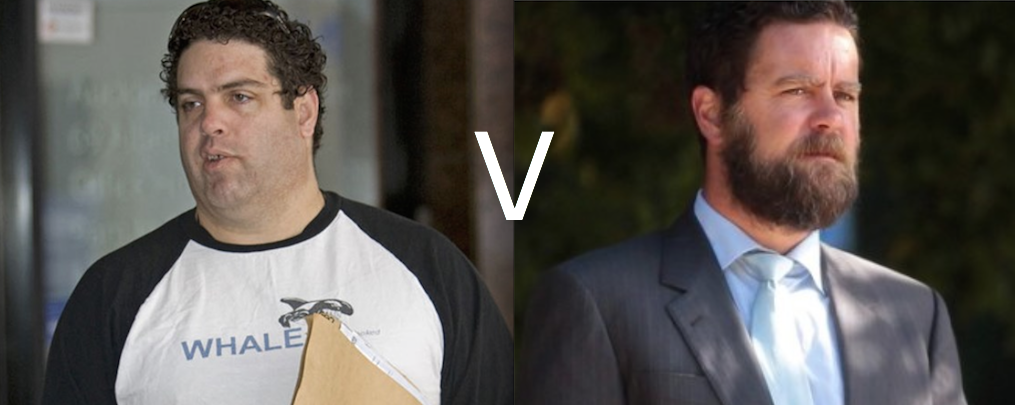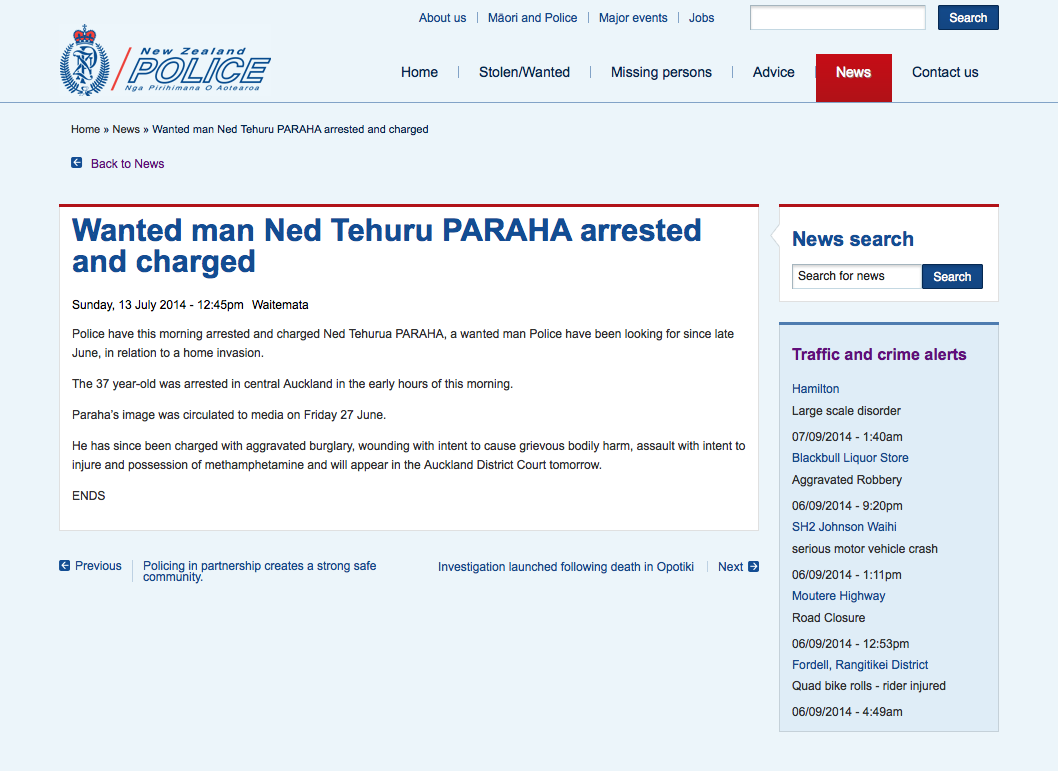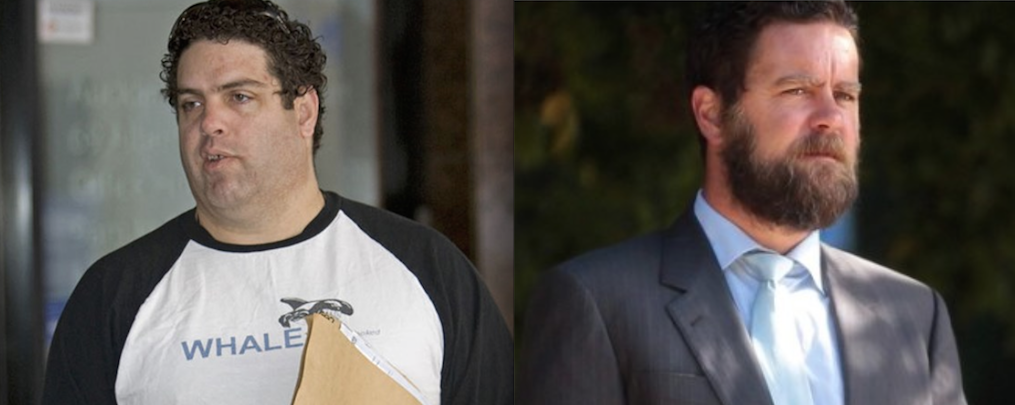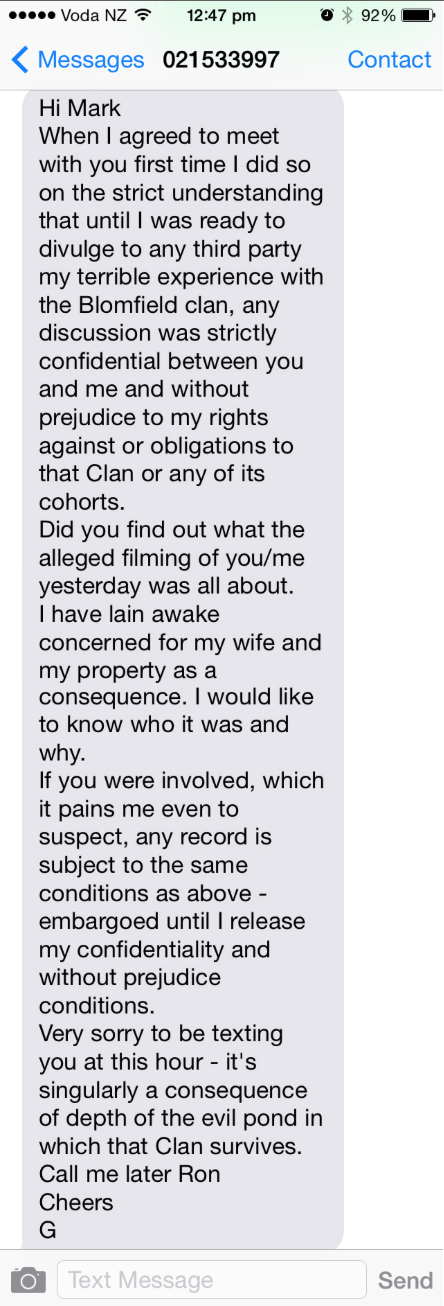
The gloves will soon be off in the Blomfield v Slater defamation tort. It’ll be a nasty scrap, but will it yeild the result that Matthew Blomfield (R) is anticipating?
Two days ago the New Zealand High court released it’s much awaited judgement in the Slater v Blomfield High Court appeal. Slater was appealing the half-baked decision of District Court Judge Charles Blackie, that blogger Cameron Slater did not constitute a journalist and as such was not entitled to protect his sources. LF argued two basic points, 1. That Blackie DCJ acted well outside his jurisdiction in even deciding Blomfield application under section 68 of the evidence Act, clearly from the outset the power to do so lay with the High Court not a humble District Court Judge. 2. That whether you liked Slater or his views he was by definition a journalist as are all bloggers who report and or comment on news and current affairs.
Somewhat amusingly two other bloggers, both who have historically held a contrary view to that of LF, the Standards Lyn Prentice, and Te Papae Papae’s Peter Aranyi have in the past few days published their own highly flawed analysis of Asher’s judgement. As always with Lynn Prentice his piece is so inaccurate it could almost have been written by Matthew Blomfield himself, Prentice already having Slater hung drawn and quartered in the substantive defamation case before it’s even kicked off.
Peter Aranyi on the other hand raises a few pertinent issues, although the conclusions he draws around the hurdles and likely success Slater might have should he appeal Asher are somewhat strange. We suspect that Aranyi’s understanding of the issues in this case may have been coloured, perhaps even tainted, by the quite separate issues canvassed in Nicky Hager’s recent book dirty politics. We’ll take a look at both articles in another post a little later.
Not withstanding the to be expected anti Slater vitriol the most important aspect of Asher J’s judgement is that he has finally ruled that bloggers, in this case Cameron Slater, are in fact journo’s, subject of course to the history of the blog, it’s purpose and content. One did not need to analyse Justice Asher’s ruling, Asher quite clearly states this fact at the conclusion of his decision:
Result
[152] The appeal is allowed in part in relation to whether Mr Slater is a journalist. Mr Slater is prima facie entitled to invoke s 68(1) in relation to sources other than Messrs Spring.
Source: http://www.laudafinem.org/wp-content/uploads/2014/09/civ2013-404-5218-12-09-2014-judg.pdf
As LF had already been arguing, since December 1st, 2013, District Court Judge Charles Blackie erred when he declared that Slater was not a journo, that’s where LF’s involvement in this saga began and our arguments have finally been sustained.
This issue is however where LF’s involvement may well have ended had it not been for the impecunious Mr Blomfield sending us an email containing a rather vague and somewhat implausible threat. Unlike other blogs LF will not change our views or bend to the will of anyone, including Blomfield, unless of course they have taken the time to raise valid objections and present substantial evidence in support of those objections, Blomfield of course, as has been his habit, did neither. It was only to be expected then that as result of Blomfield’s threatening email LF would start doing a little digging of our own, then in due course Slater’s sources and many additional informants started contacting LF directly.
LF has unfortunately been a lone voice in championing the rights of Slater in this case and perhaps even more importantly the rights of his much maligned informants. Last month after almost six months work LF came close to having a Kiwi weekly, the Sunday Star Times (SST), run an investigative piece, that however inexplicably fell over at the 11th hour when the new editor Jonathan Milne pulled the plug. Notwithstanding the SST’s failure to honour it’s agreements LF’s involvement will not end until such time as the real victims on the Blomfield v Slater case again obtain their own voice and of course long overdue justice.

Lynn Prentice, it would seem, has extraordinary difficulty in getting his facts right. Blomfields assailant has long since been located, arrested and charged and is currently being dealt with by the courts. The so-called “home invasion” at Blomfields Greenhith address was little more than a burglary gone wrong and contrary to Prentice’s misguides belief it had nothing whatsoever to do with Slater. The issue of who it actually was that discharged the firearm is also unclear, suffice to say the police have not indicated whether or not the perpertrator, Ned Paraha, was armed. It is clear however that there is much more to the story but the truth is not something that Blomfield wants the New Zealand Police, Lynn Prentice and the many other gullible halfwits like Prentice to find know.
Interestingly Justice Asher was quick to conclude that Slater’s posts seemed to hint at, what he decided had been, a degree of animosity behind the scenes. Most MSM journos, like the aforementioned bloggers, will probably make the mistake of interpreting Asher’s comments in this area as being the letting of Slater’s blood and then of course won’t be able to help themselves in making a meal of it.
Court judgements however do sometimes contain observations that are not what they at first seem, which can also then have unforeseen consequences. In Asher’s judgment the devil may well be found in the detailed reasoning behind the decision not to grant Slater’s sources the protections ordinarily afforded to journalists informants under section 68 (1) of the evidence Act. Asher’s reasoning could in fact be solid grounds for appeal. Asher J opines:
[149] Mr Blomfield’s application for an order under s 68(2) that s 68(1) is not to apply to Mr Slater is granted for these reasons:
(a) Having regard to the issues there is a public interest in disclosure of the identity of the informants.
(b) There are no likely adverse effects of the disclosure on the informants save the possibility of civil action against them by Mr Blomfield, which is not a significant factor.
(c) There is no wider public interest arising from any public importance of the issues or the persons involved, because
(i) this arises from a private dispute, and a requirement to disclose is unlikely to have a chilling effect on other whistleblowers and informants who should not be discouraged from going to the media;
(ii) the disclosures are extreme and vindictive and have the hallmarks of a private feud
(iii) the documents disclosed by the sources by providing Mr Blomfield’s hard-drive and other documents appear to have been obtained illegitimately.
[150] On balance the public interest in disclosure outweighs any adverse effects on the informants and the ability of the media to freely receive information and access sources.
Source: http://www.laudafinem.org/wp-content/uploads/2014/09/civ2013-404-5218-12-09-2014-judg.pdf
As aforesaid Ashers decision in part may appear, a first glance, to be a victory for the respondent, Matthew Blomfield, and a slap in the face for the appellant, Cameron Slater. It would however be far too soon to draw any conclusions as to why Asher used his rather strange observations to disallow Slater’s appeal under s68 (1). One would therefore be foolish to draw any inferences from what Asher has said that might be construed as favouring Blomfield, the language used, particularly at subsection 3. (C), (ii) and (iii), is colourful and may have been little little more than a wish to note that these areas needed much deeper exploration in the public interest, exploration that should it be thorough, would undoubtedly require that sworn evidence be adduced by Slater’s sources themselves – therein however lies a concealed gin-trap.
“the disclosures are extreme and vindictive and have the hallmarks of a private feud……….the documents disclosed by the sources by providing Mr Blomfield’s hard-drive and other documents appear to have been obtained illegitimately.”
Source: http://www.laudafinem.org/wp-content/uploads/2014/09/civ2013-404-5218-12-09-2014-judg.pdf
Clearly the origins of the now infamous hard drive were at issue during the appeal hearing, Asher during the hearing pointedly stating that Blomfield had educed absolutely no evidence to substantiate his claim that he even owned the items;
“It could have been owned by anyone” – Justice Raynor Asher
Slater had attempted, during the hearing, to submit a letter from the Independent Police Conduct Authority (IPCA) evidencing that the police investigation had determined that the hard drive had never been stolen or obtained “illegitimately” In fact the true ownership of the Hard Drive in question, given to the SFO, will soon be established with the production of irrefutable documentary evidence once and for all.
“You also say that Matthew Blomfield is misleading others with his “false complaints about an allegedly stolen hard drive”. The Police note that their investigation found the missing hard drive to have never been stolen, and how Matthew Blomfield refers to and reports the loss of his hard drive is his own choice” – Independent Police Complaints Authority
Source: http://www.laudafinem.org/wp-content/uploads/2014/09/140612-eod-reply-to-slater.pdf
Asher however refused leave for Slater to submit that evidence, Slater in protest then throwing that document at New Zealand Herald journalist David Fisher. Asher J now has the stupidity to include the Blomfield manufactured fallacy as one of his may reasons for disallowing part of Slater’s appeal;
“Mr Blomfield’s hard-drive and other documents appear to have been obtained illegitimately” – Justice Raynor Asher
Source: http://www.laudafinem.org/wp-content/uploads/2014/09/civ2013-404-5218-12-09-2014-judg.pdf
This then leaves Blomfield wide open on two fronts. As does Asher’s misguided assessment that the case had all “the hallmarks of a private feud”, that the “disclosures” were “extreme and vindictive”. One can of course only assume that Asher was referring to Slater’s 2012 blog posts. There is however a noticeable absence in Asher’s rhetoric, the words “unwarranted”, “malicious”, or any similar such words do not appear.

Did New Zealand High Court Justice Raynor Asher allow himself to be derailed or did he want the appearance of being fair?.
Of course Asher is right, Slater’s posts, it could be argued, in the absence of all of the facts, may have appeared to the average New Zealand Herald reader to have been “extreme and vindictive” , but Slater’s audience is a little different to most. Slater’s readers expect him to be scathing, on occasion vicious when dealing with certain subjects such as fraudsters, name suppressions and paedophiles.
Asher can also perhaps be forgiven for possessing a middle class moral compass and a politically correct world view, after all he is a judge and as such is expected to approach everything with moderation (at least in public), quite unlike Slater and his readership who have little if any regard for such high minded politically correct ideals.
Vindictive
having or showing a strong or unreasoning desire for revenge.
“the criticism was both vindictive and personalized”
synonyms: vengeful, out for revenge, revengeful, avenging, unforgiving, grudge-bearing, resentful, ill-disposed, implacable, unrelenting, acrimonious, bitter;
Slater posts may have appeared “extreme and vindictive” to Justice Asher, but then that is irrelevant, Asher was there to decide only two things, 1. was Slater a journalist, and 2. was Slater, in this case, entitled to protect his sources. Slater was successful in the first but not in the second and it’s the reasoning behind Asher’s second, arguably, less significant finding that should be looked at very closely.
Was Asher justified in his reasoning? Possibly, but only if viewed in a particular light – Asher likely knew that this case needed to be cleaved wide open, that it needed to be aired in a very public arena, in the interests of justice. After all during the hearing both Asher and the Amicus Curiae, Julian Miles, canvassed the fact that in order for Slater to mount any sort of proper defense to Blomfield’s defamation tort he would undoubtedly have to bring his “anonymous” sources in support, to give evidence, testifying to the truth of what they had provided Slater; be it their honestly held belief, documents and or other material evidence that sustained the allegations Slater had then levelled at Blomfield.
There are however two matters where Asher clearly did not have a grasp of what was at stake and what had in fact occurred outside of Slater’s so-called defamatory posts, at Para [129] Asher opines:
[129] This is not a whistleblower case. There are no political issues, or matters of public importance at stake. Mr Blomfield is not a public figure. There is no evidence that his company, now in liquidation, is the subject of ongoing public interest. The claims against him have not appeared to attract significant public interest. The overall impression given by the extensive material that has been provided is that the three named persons involved in the informing, Mr Spring, and possibly MrPowell and Ms Easterbrook, were in a dispute situation with Mr Blomfield arising out of a failed business venture. There is a good deal of material from the informants which shows a certain personal animosity towards Mr Blomfield. There is nothing to indicate that the informers have been driven by altruistic motives.
Of course the overall impression Asher speaks to was clearly born solely of the material Blomfield himself had taken exception to. Asher had obviously been misinformed as to the degree of public interest in the “informing” that had transpired with Slater’s posts in their entirety, not just those Blomfield had conveniently isolated; an “informing” that actually continues to this day and will undoubtedly continue until such time as Blomfield’s ability to strip assets and cash from embattled companies and individuals is curtailed.
The public interest was and is not just in Blomfield’s behaviour, but also that of politicians who have behind the scenes granted Blomfield special favours, in the abject failure of the mainstream media, the Courts and a number of statutory authorities to bring Blomfield to heel.
Asher perhaps also failed to appreciate the degree to which members of his own profession, New Zealand’s Lawyers, had enabled Blomfield to continue his offending by committing or having been complicit in criminal offending, again this was and is most certainly of interest to the wider public. Instead Asher, arguably in the absence of professionally presented evidence, argument and or submission, informing Asher to the contrary, seems to have very strangely formed the view that one lone person, or perhaps three, had been involved in a business venture with Blomfield, a venture that had gone pear-shaped, leaving the trio excessively bitter and twisted:
“the three named persons involved in the informing, Mr Spring, and possibly Mr Powell and Ms Easterbrook, were in a dispute situation with Mr Blomfield arising out of a failed business venture.“ – Justice Raynor Asher
Of course Asher, yet again, has managed to allow himself to be derailed, duped, like so many others before him, by placing weight on Blomfield’s false allegations.
Of course nothing could have been further from the truth. The three people Asher names in his judgement were neither bitter or twisted, nor had they all had business dealings with Blomfield, they like the vast majority of Slater’s sources simply wanted Blomfield stopped. Blomfield was after all well aware of who they were, he had afteral been the one who had named all three, in fact he focused exclusively on the the trio. Then there’s the fact that one of the three, Mr Marc Spring, has been more than candid about his involvement as a source from the start which could well explain Ashers addle-brained confusion, his inability to sort the wheat from the chaff.
Asher also seems to have placed little emphasis on the fact that some of the unknown sources, those who remained un-named in his judgement, are genuinely afraid of Blomfield, and his brother Dan who does in fact have a criminal record, only very recently released from prison for extremely violent offending, having already been threatened.
It’s almost as if these other sources did not even exist, at least in Asher’s mind. In fact one could be forgiven for thinking that Asher did not perhaps believe anyone other than those Blomfield had specifically named actually existed.

Graham Hare, lawyer and Blomfields business partner untill earlier this year witnessed the stand over tactics often employed.
A more recent example of one such fearful individual, that LF has now exposed, being Blomfield’s former lawyer and business partner Graeme Charles Hare, who in a covertly recorded conversation, discussed the attempted physical and emotional intimidation of an elderly Auckland business person with threats of violence, all of which Mr Hare claims he personally witnessed, allegedly involving brothers Daniel and Matthew Blomfield. Hare then later expressed concerns for his own safety, that of his wife and property, when he realised that Blomfield would likely find out that he’d spilled the beans.
Asher’s judgement, given the evidence before him, is however, despite it’s many glearing flaws and inaccuracies, understandable. All Asher in effect set out to do was clarify the law, specifically in what now constitutes a journalist in the internet age, especially with the more recent advent of bloggers the likes of Whale Oil, the Standard, Te Papae Papae and of course Lauda Finem.
The substantive matter of the defamation tort will now be decided in the lower jurisdiction in which it was filed, New Zealand’s District Court. We suspect that observers will get to see yet more appeals to the high Court, possibly all the way up to New Zealand’s supreme court.
There are however a few area’s in Asher J’s judgement that are certainly worth looking at more closely with a view to appeal. Whilst Asher J may have been drawn himself to conclude that Slater’s 2012 posts on Blomfield were personal in nature (or as Asher preferred, Extreme and vindictive), and that Blomfield was of little interest to the public, its a subjective view. We here at LF have certainly had a very different experience with the publics interest in Matthew John Blomfield and to some extent his associates, a group of very greedy professionals, including at least four Auckland lawyers, who have enabled Blomfield over the years.
We have also had a very different experience with respect to the sources not trusting mainstream media outlets to tell the whole truth; as a consequence we have seen a noticeable surge in informants who have preferred to seek out web based alternative media organisations such as nzpca.co.nz and laudafinem.com.
Asher it seems was also seriously misinformed when it came to the role of New Zealand’s public service, believing them to be disinterested. The authorities certainly have not lost interest in Blomfield and Co, or more importantly their dodgy “business” exploits. In fact here at LF we’ve found quite opposite to be the case. In our next article LF will explain why we know this is in fact the reality and exactly why any future investigation into Blomfield’s past and present business dealings may yet yield a result that see’s Slater and his now beseiged informants completely vindicated.
Some time ago LF received an email from a reader who wished to remain anonymous, that reader expressed a desire to send us a large brown paper parcel. The “drop” was eventually arranged, occuring outside New Zealand for reasons that will be more than obvious to the well informed.
In our next post LF will be setting out, in far greater detail, what the aforementioned documents consisted of and why we felt it necessary to investigate the matter further and then forward this new incriminating evidence to interested parties and of course the appropriate New Zealand government authorities
– Finem Lauda –






No Comments
Pretty obvious Slater will need to lodge an appeal to retain his integrity on defending sources. Blomfield will claim it as a small victory but the reality for him is now this train is rolling he can’t get off, and having the sources stand up and say what has happened to them will let any judge see that WOBH was very right to publish what he did with regards to Blomfield and his enablers. As you state here in the above post, there are at least 4 lawyers involved, and as officers of the court they need to be exposed so the wider public don’t get duped like so many already have been. I am picking Marc Spring won’t be backing out of this one, and in fact i would suggest he is probably sitting on best for last. After all Blomfield interfered in not only his business, but his personal life – and that is truly the mark of a most vile creature – and Blomfield appears to be most certainly one of those. Great work LF – looking forward to the next post.